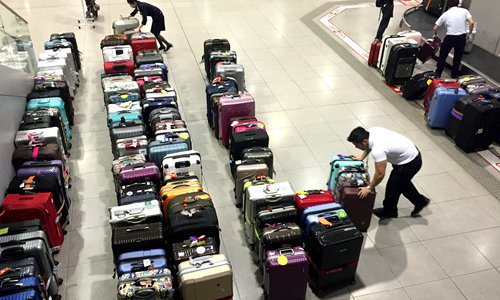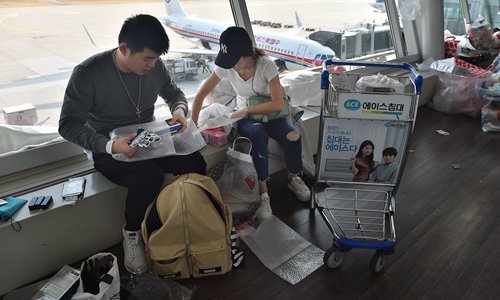
From the People’s Daily app.
This is Story in the Story.
According to China's newly released e-commerce law, private shopping agents conducting business on WeChat Moments and streaming live platforms should register with the industrial and commercial administrative departments and pay tax accordingly.
Taking effect on January 1, 2019, the law is China's first on the e-commerce sector.
A report released on 100ec.cn, a Chinese e-commerce think tank, shows that in the first half of this year, China's import volume on e-commerce platforms hit 1.03 trillion yuan ($151.4 billion), and the number will increase to 1.9 trillion yuan by the end of this year.
The report also shows that China has over 75 million frequent users of transnational online shopping services and the number will swell to reach 88 million at the end of 2018.
China's Legal Daily dubbed this a "trillion-yuan business without production but with circulation."
It's not an exaggeration to say that private overseas shopping agents have become important in many Chinese people's daily lives. However, smuggling, tax evasion, counterfeiting and personal information leakage have often made this business a target of public criticism.
Today’s story in the story will look at how the new rules clamp down on private agents that make extra money by taking foreign goods into the country without paying taxes.

Working staff from Japan's Kansai International Airport arrange luggage for passengers on February 27, 2016. Many Chinese passengers brought empty suitcases to take Japanese products back to China. (Photo: VCG)
Miaomiao (pseudonym) was working part time in a hotel in Australia's Brisbane before she became a private shopping agent (known as daigou in China) to make some extra money while taking care of her baby.
"Australia's healthcare products and milk powder are favored by Chinese consumers," Miaomiao said. "Milk powder in Australia is a big bargain compared with China. I was surprised to see milk powder was sold at up to 400 yuan a tin, while the same brand only costs 260 yuan in Australia."
Every week Miaomiao sends more than 50 tins of milk formula directly to her customers in China using an international courier after collecting orders from her customers via WeChat.
However, a new law in China promises to bring big changes to people smuggling foreign goods into China to avoid taxes, starting on January 1, 2019.
"I will manage to send the milk powder back through every legal way, because the moms trust in and rely on milk powder from Australia. As for the luxury bags, I guess I will stop taking them to China personally." Miaomiao said.
He Xiaoyun said she will wait and see. "I will stop if there's no other way."
She and her husband travel frequently to Seoul and Tokyo, and help some friends buy cosmetics and luxury bags to offset traveling expense.
On Zhihu, China's Quora-like question-and-answer platform, many articles uncover various "traps" related to daigou and how to avoid them.
"Everything can be forged, packages, receipts in different languages, anti-counterfeit labels and everything, there's no way to tell them from the real ones with the naked eye," an insider said in a post.
A man surnamed Lin in Ningbo of East China's Zhejiang Province said he was swindled by an online shop on Taobao, China's leading e-commerce platform. Lin told the local media that his wife spent 5,399 yuan ($794) on two pairs of sandals from an online shop on Taobao which claims to sell luxury goods. The sandals were proved to be counterfeit. The sellers admitted the fraud but refused to offer a refund and disappeared from the platform.

A Chinese couple, who work as private shopping agents, is repacking products they brought in South Korea before flying from Seoul to China in November 2016. (Photo: VCG)
An anonymous courier said that some courier companies provide a service to change the delivery address at the customers' request. "Your parcel might have been delivered from a domestic point of origin, but you receive notification that it has been sent from a bonded warehouse," said the courier.
"The e-commerce law is necessary to control the lawless competition in e-commerce," said Liu Junhai, a business law professor with the Renmin University of China.
"The law explicitly defines illegal conduct in the e-commerce sector, and protects the consumers' legitimate rights," Liu said.
In a WeChat group with more than 300 members, Feng Xiaohua (pseudonym) received a dozen shopping requests for various items including leggings, pillows and even seafood. Residing in Canada, Feng travels a lot between North American metropolises and China on business errands.
"All my buyers think products there are cheap and safe, with no need to worry about the quality, especially milk powder," said Feng. "I am just trying to make some pocket money on the sidelines of my work."
"Products carried by shopping agents entering China are merchandise, and should go through customs and be subject to tariffs," said Huang Chao, a lawyer with the Jiangsu Yihua Law Firm.
"The law regulates economic activities of both online retailers and e-commerce platforms. This will play an important role in forging an honest, fair and better e-commerce environment," Huang said on Wednesday.
"Licensed shopping agents can be trusted by more consumers, which helps to boost sales," said Huang.
Huang also said that it will be easier for consumers to file complaints and safeguard their legal rights once a dispute occurs during online trade.
"The law guarantees fair competition. Legitimate and honest private shopping agents will be protected and those who violate the law will be punished," said Liu.
"Private shopping agents should not be banned indiscriminately," Liu noted.
Liu said that China's legal system is being improved with rapid economic and social development. The e-commerce law is to enhance people's sense of fulfillment and happiness.
Liu suggests that authorities further decrease the import tariffs on luxury products to fulfill Chinese people's growing demand.
Liu also calls for e-commerce retailers to pay tax according to the law and to stand against illegal activities such as selling counterfeit goods.
(Produced by Nancy Yan Xu, Da Hang, Raymond Mendoza, Lance Crayon and Grace Xinyi Song. Music by: bensound.com. Text from Global Times.)


